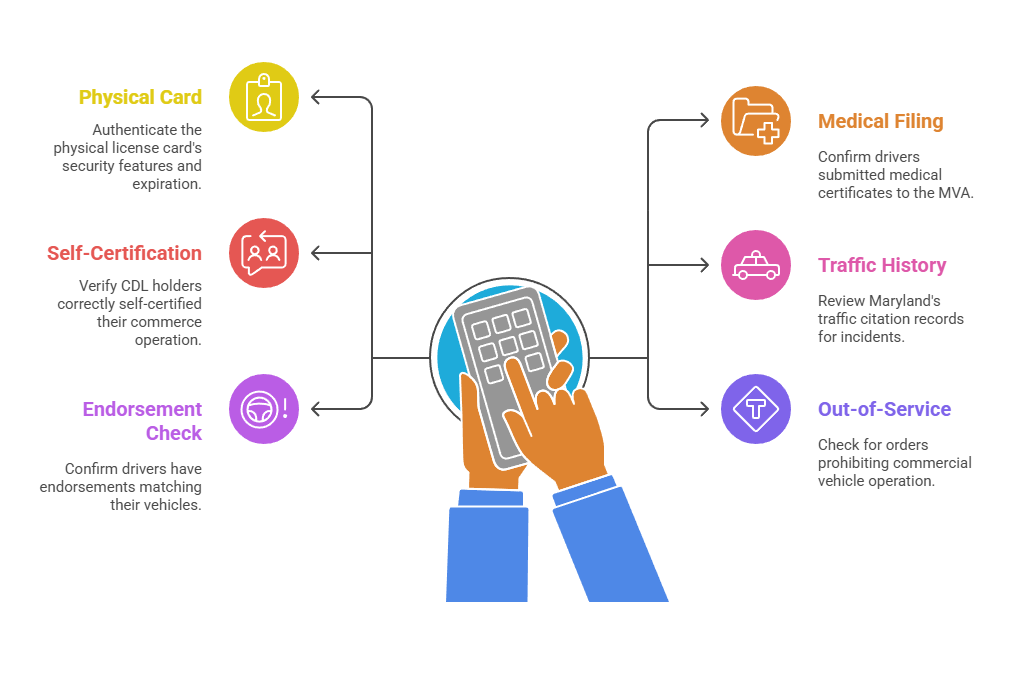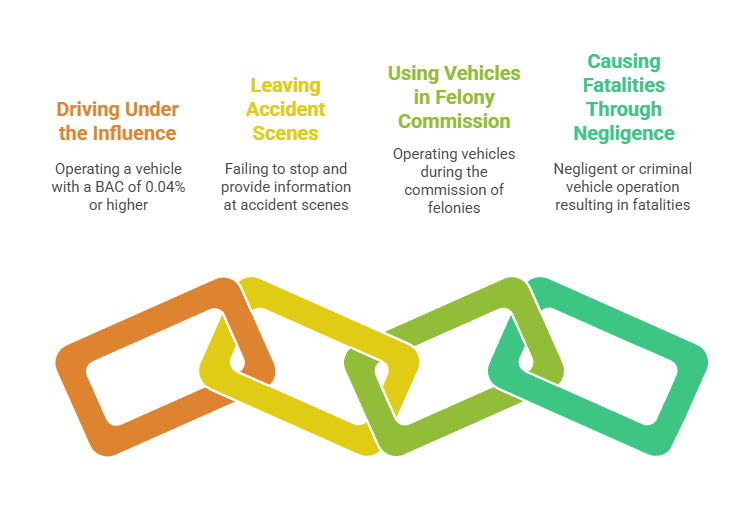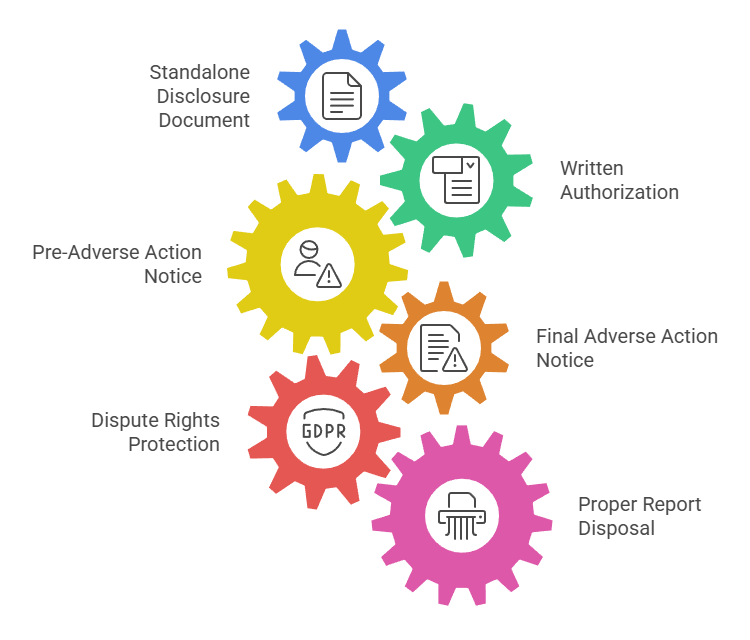Maryland employers hiring commercial drivers must navigate a complex intersection of federal DOT regulations, state-specific CDL requirements, and FMCSA clearinghouse mandates. This comprehensive guide provides transportation companies with the precise screening protocols, legal requirements, and implementation strategies needed to conduct thorough Maryland CDL background checks while mitigating liability risks.
Key Takeaways
- Maryland CDL background checks require coordination between federal FMCSA clearinghouse queries, state MVR reports, and DOT-compliant drug and alcohol testing programs.
- Employers must conduct pre-employment clearinghouse queries and annual limited queries for all CDL holders operating commercial motor vehicles.
- The Maryland Motor Vehicle Administration maintains comprehensive driver records including CDL status, violations, and disqualifications accessible through official MVR requests.
- DOT drug testing regulations mandate five-panel screening for marijuana, cocaine, amphetamines, opioids, and phencyclidine using certified collection sites.
- Maryland follows federal disqualification standards that can suspend CDL privileges for 60 days to lifetime depending on violation severity.
- FCRA compliance requires written authorization, pre-adverse action notices, and proper dispute procedures when using consumer reporting agencies.
- Previous employment verification for the past three years is federally mandated for all commercial driver applicants under FMCSA safety regulations.
- Continuous monitoring through annual clearinghouse queries and routine MVR checks helps employers identify disqualifying incidents before they create liability exposure.
Understanding Maryland CDL Background Check Requirements
Maryland commercial driver screening operates under a dual regulatory framework. Federal Department of Transportation requirements combine with state-specific Motor Vehicle Administration protocols. The Federal Motor Carrier Safety Administration establishes baseline standards for all commercial drivers nationwide. Meanwhile, Maryland's MVA implements additional state-level verification and documentation requirements. These overlapping jurisdictions create compliance obligations that employers must address systematically. Penalties range from $10,000 per violation for clearinghouse failures to potential negligent hiring liability.
The foundation of Maryland CDL background checks rests on three critical verification pillars. These include driver qualification file documentation, controlled substance and alcohol testing compliance, and continuous monitoring of driver safety performance. Transportation companies must establish written policies addressing each component. They must also maintain records that demonstrate ongoing compliance with both 49 CFR Part 382 drug testing regulations and 49 CFR Part 391 driver qualification standards. Maryland employers who fail to implement comprehensive screening protocols face elevated accident liability risks. They also risk potential loss of operating authority following DOT audits.
Understanding the distinction between commercial driver screening and standard employment background checks is essential. CDL background verification involves specialized reporting systems. These include the FMCSA Drug and Alcohol Clearinghouse, the Commercial Driver's License Information System (CDLIS), and state-maintained traffic violation databases. Standard consumer reporting agencies cannot fully access these systems. This specialized infrastructure requires transportation employers to work with screening providers who maintain direct integrations. These providers must also ensure FCRA compliance throughout the verification process.
Federal vs. State CDL Screening Authority
Understanding the jurisdictional boundaries between federal and state CDL requirements helps Maryland fleet managers navigate overlapping compliance obligations. The Federal Motor Carrier Safety Administration establishes baseline requirements that all states must enforce. Meanwhile, Maryland retains authority to implement additional screening elements beyond federal minimums. Transportation companies must satisfy both regulatory layers to maintain full compliance.
| Aspect | Federal Requirements | Maryland State Requirements |
| Clearinghouse Queries | Mandatory pre-employment and annual limited queries for all CDL holders | Must comply with federal standards; no state-level clearinghouse alternatives |
| Drug Testing Standards | 5-panel DOT testing using urine specimens from HHS-certified labs | Cannot substitute alternative testing methods; may add company-specific testing beyond federal minimums |
| Disqualification Periods | Standardized suspension timeframes (60 days, 120 days, 1 year, lifetime) based on violation type | Must enforce federal minimums; can impose additional state administrative actions |
| Medical Certification | FMCSA National Registry medical examiners; 24-month maximum validity | Requires drivers to self-certify commerce type with MVA; maintains medical certification database |
| Previous Employment Verification | 3-year lookback for all DOT-regulated employers | Must satisfy federal requirement; MVA does not maintain employment verification database |
| MVR Requirements | No specific federal MVR check frequency mandate | MVA serves as authoritative source; provides comprehensive state driving records |
The practical implication for fleet managers is straightforward. Maryland CDL background check procedures must address the most restrictive requirement when federal and state standards differ. Transportation companies operating interstate must satisfy both federal baseline requirements and Maryland's specific additions. Intrastate-only carriers must meet whichever standard is more stringent for each compliance element.
Key Maryland Motor Vehicle Administration Requirements
The Maryland MVA serves as the state's authoritative source for commercial driver licensing status. It provides endorsement verification and driving history records that employers must review before hiring decisions. Maryland implements specific state-level documentation and verification protocols that supplement federal CDL requirements. Employers can request official MVR reports directly through the MVA's online portal. Alternatively, they can use FCRA-compliant consumer reporting agencies that maintain Maryland data access agreements.
Maryland-specific CDL verification requirements include:

- Physical CDL Card Authentication: Verify the authenticity of the physical license card including security features, expiration date, and endorsements.
- Medical Certification Filing Confirmation: Confirm that drivers have properly submitted medical examiner certificates to the MVA when required.
- Self-Certification Category Review: Verify that CDL holders have correctly self-certified their commerce operation type.
- Comprehensive Traffic Violation History: Review Maryland's complete traffic citation records that may include incidents not yet reflected in interstate databases.
- CDL Endorsement Verification: Confirm that drivers possess proper endorsements matching the vehicles they will operate.
- Out-of-Service Orders: Check for any administrative orders prohibiting commercial vehicle operation due to medical certification lapses or safety violations.
Hiring decisions based on incomplete MVA record verification can result in employing drivers who lack proper medical qualification. This creates direct liability exposure if those drivers subsequently cause accidents attributable to unidentified medical conditions or disqualified operating status.
FMCSA Drug and Alcohol Clearinghouse Compliance
The FMCSA Drug and Alcohol Clearinghouse, operational since January 2020, fundamentally transformed commercial driver background screening. It created a centralized federal database tracking all DOT drug and alcohol program violations. Maryland employers must conduct full clearinghouse queries before allowing any CDL holder to operate a commercial motor vehicle for the first time. They must also perform annual limited queries for all active commercial drivers. Clearinghouse violations remain visible to employers until the driver completes the return-to-duty process. This process involves working with a qualified substance abuse professional and completing a follow-up testing protocol.
Registration requirements mandate that both employers and drivers maintain active clearinghouse accounts. However, access permissions differ significantly between these user types. Employers must obtain specific written consent from drivers before conducting full pre-employment queries. Annual limited queries require only general authorization included within employment agreements. Third-party administrators can conduct clearinghouse queries on behalf of motor carriers. However, the employer retains ultimate responsibility for timely query completion and appropriate action on positive results.
Pre-Employment Clearinghouse Query Process
Conducting compliant pre-employment clearinghouse queries requires Maryland employers to obtain driver-specific electronic consent. This consent must come through the clearinghouse system before accessing any violation information. Drivers must log into their personal clearinghouse accounts and provide limited-duration consent. This consent authorizes the specific employer to view their complete drug and alcohol testing history. The clearinghouse returns three possible query results that dictate employer obligations. These include no records found, violations exist with return-to-duty incomplete, or violations exist with return-to-duty completed.
Annual Limited Query Requirements
Maryland employers must conduct limited clearinghouse queries at least once annually for all employed CDL holders. Unlike pre-employment full queries requiring individual driver consent, limited queries operate under general consent. This general consent is typically included within driver employment agreements or company policy acknowledgments. These annual checks identify any violations that occurred since the driver's employment began. Limited query results indicating violations trigger immediate action requirements. These include removing the driver from safety-sensitive functions and conducting a full query to obtain complete violation details.
Maryland Motor Vehicle Record (MVR) Screening
Motor Vehicle Record checks form the cornerstone of commercial driver screening. They provide comprehensive driving history documentation that reveals traffic violations, license suspensions, at-fault accidents, and CDL disqualifications. Maryland employers must obtain official MVR reports directly from the state Motor Vehicle Administration or through FCRA-compliant screening providers. These reports document all Maryland-issued traffic citations and administrative actions. They also reflect out-of-state incidents reported through interstate data sharing agreements. Understanding MVR reporting limitations is critical. Standard reports typically reflect violations occurring within the past three years.
Interpreting Maryland MVR Reports
Maryland MVR reports contain standardized coding systems that identify violation types, conviction dates, and point assignments. Key elements requiring specific attention include "serious traffic violations" as defined under federal regulations. These encompass excessive speeding (15+ mph over limit), reckless driving, improper lane changes, and following too closely. They also include traffic offenses committed in commercial motor vehicles. Two serious violations within three years triggers a 60-day CDL disqualification. Three serious violations mandates 120-day disqualification.
Out-of-State Violation Reporting
Maryland participates in the Driver License Compact and the Commercial Driver's License Information System. However, interstate data transmission delays and varying state reporting practices can create temporary gaps. Recent out-of-state violations may not have posted to the Maryland driving record yet. Transportation companies operating across multiple states should implement direct verification procedures. This is especially important with states where their drivers frequently operate.
DOT Drug and Alcohol Testing Requirements
Federal DOT drug testing regulations under 49 CFR Part 382 establish mandatory testing protocols. These apply to all commercial drivers operating vehicles requiring CDL licenses. The DOT requires five specific testing circumstances: pre-employment, random, post-accident, reasonable suspicion, and return-to-duty testing following violations. Each testing category carries distinct procedural requirements, timing mandates, and consequence frameworks. Transportation companies must document these through written policies.
DOT drug testing exclusively uses urine specimen collection analyzing for five substance categories. Maryland employers cannot substitute hair testing, oral fluid testing, or expanded panel testing to satisfy federal requirements. All DOT drug testing must utilize laboratories certified by the Department of Health and Human Services (HHS). Tests must also employ Medical Review Officer (MRO) verification of positive results before employers receive confirmed test outcomes.
| Testing Type | Frequency/Trigger | Key Requirements |
| Pre-Employment | Before first safety-sensitive function | Negative result required; can accept previous employer test within 30 days |
| Random | 50% annual for drugs, 10% for alcohol | True random selection; immediate notification required |
| Post-Accident | After qualifying accidents | Must test within specific timeframes based on accident severity |
| Reasonable Suspicion | Observable behavior/appearance | Supervisor training required; contemporaneous documentation |
| Return-to-Duty | After violation before resuming duties | SAP evaluation and recommendation required |
Random testing program administration presents particular compliance challenges for smaller Maryland fleets. This is due to statistical requirements. True random selection requires unpredictable timing and impartial selection methodologies. These characteristics are difficult for small employers to achieve without third-party administrator support.
Pre-Employment Testing Protocols
DOT pre-employment drug testing must occur before drivers perform their first safety-sensitive function. Maryland employers typically issue conditional offers contingent on successful completion of several requirements. These include pre-employment drug screening, clearinghouse verification, and MVR review. The pre-employment test requires negative results verified by an MRO. This must occur before the driver operates any commercial motor vehicle. Most testing completion occurs within 48-72 hours.
Random Testing Program Compliance
Maryland employers must establish genuinely random selection systems using methodologically sound approaches. The selection process must ensure equal probability that any covered driver could be selected for any testing period. It must also ensure no advance notice is given. Annual random testing rates mandate minimum thresholds. These are 50% for drug testing and 10% for alcohol testing. Calculations are based on the average number of covered driver positions rather than individual persons.
Maryland CDL Disqualifications and Violations
CDL disqualification standards under federal regulations establish minimum mandatory suspension periods. Maryland must enforce these for serious traffic violations, major disqualifying offenses, and railroad crossing violations. These disqualifications operate separately from state-level license suspensions. Maryland employers who knowingly allow disqualified drivers to operate commercial vehicles face substantial penalties. These include potential loss of operating authority and civil fines reaching $16,000 per violation.
Understanding the tiered disqualification structure helps Maryland fleet managers assess risk. This is particularly important when evaluating drivers with violation histories. First-time major offenses trigger minimum one-year CDL disqualifications. These offenses include DUI, hit-and-run, using CMVs in felony commission, or driving CMVs with suspended licenses. Second lifetime major offenses elevate to permanent disqualification.
Major Disqualifying Offenses
Federal regulations identify specific major offenses that carry mandatory CDL disqualifications. These apply regardless of whether violations occurred while operating commercial or personal vehicles:

- Driving Under the Influence: Operating any vehicle with blood alcohol concentration of 0.04% or higher results in minimum one-year first-offense disqualification. This extends to three years if transporting hazardous materials.
- Leaving Accident Scenes: Failing to stop and provide information at accident scenes constitutes major disqualifying conduct. It carries a one-year minimum suspension.
- Using Vehicles in Felony Commission: Operating vehicles during commission of felonies triggers immediate disqualification. Enhanced penalties apply for controlled substance violations.
- Causing Fatalities Through Negligence: Negligent or criminal vehicle operation resulting in fatalities creates permanent disqualification exposure.
Maryland employers evaluating applicants with major offense histories must recognize important limitations. Rehabilitation and time passage don't eliminate disqualification status. Formal reinstatement processes must be completed first.
Serious Traffic Violation Accumulation
The accumulation model for serious traffic violations creates progressive disqualification exposure. Violations qualifying as "serious" under federal definition include excessive speeding (15+ mph above posted limits) and reckless driving. They also include improper or erratic lane changes and following other vehicles too closely. Additional serious violations include traffic offenses causing fatal accidents and driving CMVs without proper CDL licenses or endorsements. Two serious violations within three-year lookback periods trigger 60-day disqualifications. Three serious violations mandate 120-day suspensions.
Driver Qualification Files and Documentation

Federal regulations under 49 CFR Part 391 mandate comprehensive driver qualification files. These must document each commercial driver's eligibility to operate commercial motor vehicles. Maryland employers must maintain specific documents. These include the employment application, MVR reports, previous employer verification records, medical examiner certificates, road test certifications, and annual driving record reviews. These files must remain current throughout employment tenure. They must also be made available during DOT compliance reviews.
The three-year previous employment verification requirement creates particular challenges. This especially affects Maryland employers hiring drivers with multiple recent employers. Federal regulations require written or documented verbal contact with all DOT-regulated employers from the past three years. Employers must specifically investigate safety performance history, accident records, drug and alcohol testing violations, and reasons for employment separation.
Medical Certification Requirements
CDL holders operating in interstate commerce must obtain medical examiner certificates from FMCSA-registered medical examiners. Maryland employers verify medical certification status through direct review of medical examiner certificates. They also confirm that drivers have self-certified their commerce type with the Maryland MVA. Medical certification lapses create immediate CDL downgrade situations. The Maryland MVA administratively reduces the license to non-commercial status until current certification is provided.
Annual Driver Record Reviews
Federal regulations require employers to conduct annual reviews of each commercial driver's driving record. This annual process serves multiple compliance purposes. These include satisfying DOT documentation requirements and identifying violation patterns indicating deteriorating safety performance. It also verifies continued license validity and medical certification status. Maryland employers typically obtain fresh MVR reports annually as the foundation for these reviews. These are supplemented by internal incident reports and customer complaints.
FCRA Compliance for Commercial Driver Screening
The Fair Credit Reporting Act establishes consumer protection standards. These apply when Maryland employers use third-party consumer reporting agencies to conduct background screening. Screening includes MVR reports, criminal records, and employment verification. Transportation companies conducting in-house verification directly with government agencies and previous employers aren't subject to FCRA requirements. However, most employers utilize screening companies for efficiency. FCRA compliance creates specific procedural obligations throughout the screening and hiring process. These protect applicant rights while enabling employers to make informed hiring decisions.
Maryland employers implementing FCRA-compliant screening programs must address multiple procedural requirements:

- Standalone Disclosure Documents: Provide clear, conspicuous disclosure in a document separate from employment applications. This must indicate that consumer reports may be obtained for employment purposes.
- Written Authorization: Obtain explicit written consent from applicants before requesting any consumer reports. Authorization forms must contain unambiguous consent language.
- Pre-Adverse Action Notice: Before declining to hire based on screening results, provide applicants with copies of consumer reports. Also provide Summary of FCRA Rights and reasonable time (5-7 days) to dispute inaccuracies.
- Final Adverse Action Notice: After the waiting period, send final notices documenting the decision. Identify the screening company and reiterate dispute rights.
- Dispute Rights Protection: Enable applicants to challenge report accuracy. Provide screening company contact information and explanation of correction procedures.
- Proper Report Disposal: Implement secure destruction procedures for consumer reports. This prevents unauthorized access to sensitive applicant information.
Pre-employment disclosure and authorization represent the initial FCRA compliance requirements. Standalone documents must clearly indicate screening scope and obtain unambiguous consent. Adverse action procedures require particular attention when Maryland employers decline to hire applicants. This is especially true when decisions are based wholly or partially on background screening results. Failure to follow proper notification sequences creates liability exposure under federal law.
Implementing Continuous Monitoring Programs
Traditional point-in-time background screening creates accuracy gaps. Pre-employment verification rapidly becomes outdated when drivers receive new violations or medical certifications expire. Maryland transportation companies increasingly implement continuous monitoring programs. These automatically alert management when employed drivers experience license status changes. They also alert when drivers receive new traffic citations or appear in clearinghouse violation records. These proactive systems enable immediate intervention before drivers accumulate disqualifying violations.
Continuous MVR monitoring services integrate with state motor vehicle databases. They identify new traffic violations, license suspensions, and address changes as they post to official records. These automated systems eliminate reliance on driver self-reporting. This is an unreliable compliance strategy given that many drivers hesitate to voluntarily disclose violations that might threaten employment. Maryland fleet managers receive email or dashboard alerts when monitored drivers experience reportable events.
Technology Solutions for Driver Monitoring
Modern driver monitoring platforms integrate multiple data sources. These include clearinghouse status, MVR records, medical certification expiration tracking, and drug testing schedules into centralized dashboards. Leading platforms offer features that transform compliance management:
- Automated Expiration Tracking: System-generated alerts for medical certificates, CDL renewals, and drug testing requirements eliminate manual calendar management.
- Mobile Driver Applications: Drivers can photograph updated medical certificates and upload training documentation. They also receive push notifications about upcoming requirements.
- Audit Trail Documentation: Timestamped notifications, driver acknowledgments, and systematic record-keeping withstand DOT scrutiny during compliance reviews.
- Dashboard Visibility: Real-time compliance status across entire driver populations enables proactive intervention before violations occur.
These systems automate processes that consume substantial HR time when managed through spreadsheets or manual systems.
Creating Response Protocols for Violations
Continuous monitoring programs deliver maximum value when Maryland employers establish clear response protocols. These written procedures should address immediate license verification for any suspension alerts. They should also cover supervisor notification requirements and temporary duty reassignment during investigation periods. Additionally, they should establish progressive discipline standards for accumulating violations. Response protocols should distinguish between violations requiring immediate service removal versus those warranting investigation and coaching. Immediate removal violations include DUI arrests, license suspensions, and clearinghouse violations. Investigation-appropriate violations include minor traffic citations and first-time preventable accidents.
Conclusion
Maryland CDL background checks require coordinated implementation of federal clearinghouse queries, state MVR verification, and DOT drug testing programs. They also require comprehensive driver qualification file maintenance. Transportation companies that systematically address each compliance component significantly reduce accident liability exposure. They also reduce DOT violation risks. The investment in robust screening infrastructure generates returns through lower insurance premiums and improved safety performance. It also enhances the reputation that attracts quality driver candidates. Maryland fleet managers should prioritize developing written compliance procedures. They should establish relationships with qualified screening providers and implement technology solutions that automate tracking requirements for sustainable long-term compliance.
Frequently Asked Questions
What is required for a Maryland CDL background check?
Maryland CDL background checks require FMCSA Drug and Alcohol Clearinghouse queries and state Motor Vehicle Record reports. They also require DOT-compliant drug testing, three-year previous employment verification, and medical certification verification. Driver qualification file documentation is also necessary. Employers must coordinate federal DOT requirements with Maryland-specific MVA verification to ensure complete compliance. These comprehensive screenings typically take 3-5 business days depending on previous employer responsiveness and drug testing laboratory processing times.
How long does a Maryland CDL background check take?
Maryland CDL background check completion typically requires 3-5 business days for comprehensive screening. Clearinghouse queries provide immediate results. MVR reports arrive within 24-48 hours. Drug testing with MRO verification takes 24-72 hours. Previous employment verification may extend timelines to 5 business days when former employers are difficult to contact or slow to respond.
Do Maryland employers need to check the FMCSA Clearinghouse?
Yes, federal regulations mandate that all employers of CDL holders conduct full clearinghouse queries. These must occur before first safety-sensitive functions. Annual limited queries are also required for all active commercial drivers. Maryland transportation companies face penalties up to $10,451 per violation for failing to conduct required clearinghouse checks. Drivers with unresolved violations cannot legally operate commercial motor vehicles until return-to-duty processes are completed.
What disqualifies you from getting a CDL in Maryland?
Maryland CDL disqualifications include DUI convictions (minimum 1-year suspension) and using vehicles in felony commission. Leaving accident scenes also disqualifies drivers. Multiple serious traffic violations create disqualifications: 2 violations equal 60 days, 3 violations equal 120 days. Additional disqualifications occur for railroad crossing violations, positive drug or alcohol tests, and expired medical certifications. False application information and certain criminal convictions also cause disqualifications depending on severity.
How far back do Maryland MVR reports go?
Maryland Motor Vehicle Records typically display three years of traffic violation history for most offenses. Serious violations including DUI convictions, CDL disqualifications, and license suspensions may appear for longer periods. This depends on state retention schedules. Employers should request comprehensive MVR reports covering the full available history. They should supplement these with previous employer verification for complete driving performance assessment.
What is the DOT drug testing panel for Maryland CDL drivers?
DOT drug testing for Maryland commercial drivers uses a 5-panel test. It screens for marijuana (THC), cocaine, amphetamines, opioids, and phencyclidine (PCP) through urine specimen analysis. All testing must use HHS-certified laboratories with Medical Review Officer verification of positive results. Maryland employers cannot substitute alternative testing methods like hair or oral fluid testing to satisfy federal DOT requirements.
Can Maryland CDL drivers with past violations be hired?
Maryland employers can hire CDL drivers with past violations depending on violation type, time passage, and company policy standards. Drivers must have completed any disqualification periods and return-to-duty processes for drug violations. This must occur before they can legally operate commercial vehicles. Many transportation companies implement lookback periods and point systems. These establish thresholds for acceptable violation histories. Serious offenses like DUI create longer exclusion periods.
How often should Maryland employers run MVR checks on commercial drivers?
Federal regulations require annual MVR reviews documented in driver qualification files. However, Maryland transportation companies implementing continuous monitoring or semi-annual MVR checks significantly improve safety performance and compliance. Continuous monitoring programs provide real-time alerts when new violations occur. This enables immediate intervention before drivers accumulate disqualifying violations. It also helps identify patterns that reveal deteriorating safety performance.
Additional Resources
- FMCSA Drug and Alcohol Clearinghouse Registration and User Guide
https://clearinghouse.fmcsa.dot.gov/ - Maryland Motor Vehicle Administration CDL Information and Services
https://mva.maryland.gov/drivers/pages/commercial-drivers-license.aspx - Federal Motor Carrier Safety Regulations Part 391 - Qualifications of Drivers
https://www.ecfr.gov/current/title-49/subtitle-B/chapter-III/subchapter-B/part-391 - Federal Motor Carrier Safety Regulations Part 382 - Controlled Substances and Alcohol Testing
https://www.ecfr.gov/current/title-49/subtitle-B/chapter-III/subchapter-B/part-382 - Federal Trade Commission Fair Credit Reporting Act Guidance
https://www.ftc.gov/legal-library/browse/statutes/fair-credit-reporting-act - Commercial Driver's License Information System (CDLIS) State Resources
https://www.aamva.org/topics/commercial-driver-license-information-system
Still have questions?
Get in touch with our team today for a personalized demo and discover how our tailored volume pricing and packages can drive results for your business!
How useful was this page?*
Note: your comments are anonymous. We use them to improve the website. Do not include any personal details.
Visit our FCRA Compliance Tool or leave a message here if you need a response.
From the blog Explore the GCheck Content Hub

Financial Sector Background Checks: Navigating the 2026 Screening Landscape
13 Jan, 2026 • 18 min read
Future-Proofing Your Healthcare Screening Program: 2026 Compliance Architecture
13 Jan, 2026 • 20 min read
FCRA Compliance in Transportation and Logistics: 2026 Operational Framework
13 Jan, 2026 • 21 min readThe information provided in this article is for general informational and educational purposes only and should not be construed as legal advice or a substitute for consultation with qualified legal counsel. While we strive to ensure accuracy, employment screening laws and regulations—including but not limited to the Fair Credit Reporting Act (FCRA), Equal Employment Opportunity Commission (EEOC) guidelines, state and local ban-the-box laws, industry-specific requirements, and other applicable federal, state, and local statutes—are subject to frequent changes, varying interpretations, and jurisdiction-specific applications that may affect their implementation in your organization. Employers and screening decision-makers are solely responsible for ensuring their background check policies, procedures, and practices comply with all applicable laws and regulations relevant to their specific industry, location, and circumstances. We strongly recommend consulting with qualified employment law attorneys and compliance professionals before making hiring, tenant screening, or other decisions based on background check information.

